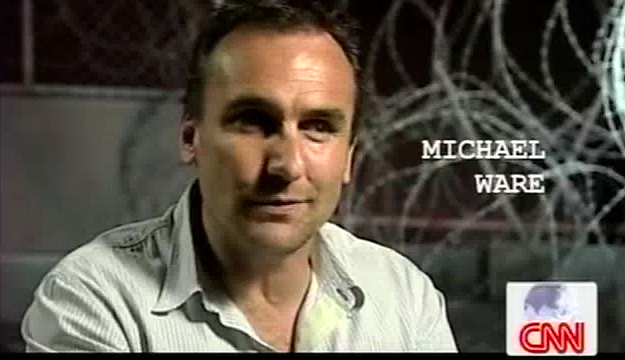Witness to War

Witness to War is a documentary from CNN International in which six war correspondents -- Atia Abawi, Stan Grant, Nic Robertson, Reza Sayah, Ivan Watson, and Michael -- discuss the war in Afghanistan/Pakistan and the people and events they have covered there. These are just the segments Michael contributed; to view the entire special, go here.
Segment 1
Length: 1:11
LARGE (13.7 MB) ----- SMALL (1.3 MB)
MICHAEL WARE, CNN INTERNATIONAL CORRESPONDENT: It's easy to argue that that's when 9/11 and a lot of other problems in the region were born. When America simply walked away once the Soviets withdrew.
Don't forget, there was a war under way in Afghanistan at the time of 9/11. There were front-lines active at that moment as the Taliban were fighting other Afghans.
9/11 obviously changed everything. The reason why the West is there is to answer a security threat being posed by the al Qaeda organization in exporting terrorist attacks from its planning and strategic bases in Afghanistan and in the tribal areas of Pakistan.
Segment 2
Length: 0:54
LARGE (10.5 MB) ----- SMALL (1012 KB)
WARE: The Bush administration shifted the focus of its counterterrorism operations, its anti-al Qaeda operations, its so-called "War on Terror" to Iraq. Iraq!
We now know that there was no casus belli for that. Al Qaeda wasn't here. Saddam wasn't projecting a terrorist threat beyond his immediate borders, certainly not to the United States. Heck, the regime of Saddam Hussein didn't even possess weapons of mass destruction. The U.N. kept saying that.
So, like it did after the Soviet withdrawal, the invasion of Iraq took America's eye off Afghanistan. And America is still paying a price for that to this day.
Segment 3
Length: 0:21
LARGE (4.2 MB) ----- SMALL (416 KB)
WARE: For a year after 9/11, I lived in Kandahar, pretty much with the Taliban. They'd changed uniforms. Their turbans mightn't have been the same. They suddenly may have been the chiefs of police in districts and local administrators, but they were still the Taliban.
Segment 4
Length: 0:38
LARGE (7.3 MB) ----- SMALL (720 KB)
WARE: The Afghan Taliban is a complex beast with many, many faces and many, many applications. One thing for sure is that it has proven its capability to endure. What we now also see, however, is the emergence in recent years of a Pakistani Taliban. These are two entirely different organizations, yet in many ways, they share a similar philosophy and ideology, and a war-fighting capability. In essence, the concept of the Taliban is flourishing and growing across the border.
Segment 5
Length: 1:18
LARGE (15.1 MB) ----- SMALL (1.5 MB)
WARE: Afghanistan and to a slightly lesser degree Pakistan are places where it's very easy to lose your life.
It was in Afghanistan where after 9/11, it was first I had AK-47s pointed at my head. It's where I first learned how to watch a room. Where I first learned to pay attention to what was outside my window on the street every day, looking for things that changed. It was in Afghanistan that I knew that there was no one you could trust and you're on your own. You were going to survive by your own wit.
Segment 6
Length: 1:46
LARGE (20.6 MB) ----- SMALL (1.9 MB)
WARE: The kids don't leave you. Never.
I remember a time when I was living in Kandahar back in 2002. It was in the first blush after the invasion, the Taliban had only just left. I was living in this very dingy hotel in the center of the city. Next door was an abandoned government compound. A displaced family moved in.
The way a lot of Afghans cut grass is by burning it. A 6-year-old boy and his 8-year-old brother were burning the grass. They didn't know that there was unexploded bombs in the grass. They detonated right next to the hotel, and we ran down and we found these two kids. I remember by the time we took them to the hospital, we were just covered in blood, and when we got there, there was no medicine to give them, not even painkillers. The boy who we watched die, I gave him Advil because it was more than anyone else could give him. I can still remember his brother wailing. I remember that sound as I left that hospital. I can remember it right now. That's kids in war.
Segment 7
Length: 0:10
LARGE (2.0 MB) ----- SMALL (204 KB)
WARE: And in many ways, it's in the West's national interests to see these issues resolved. And in many ways, it's just the right thing to do.
